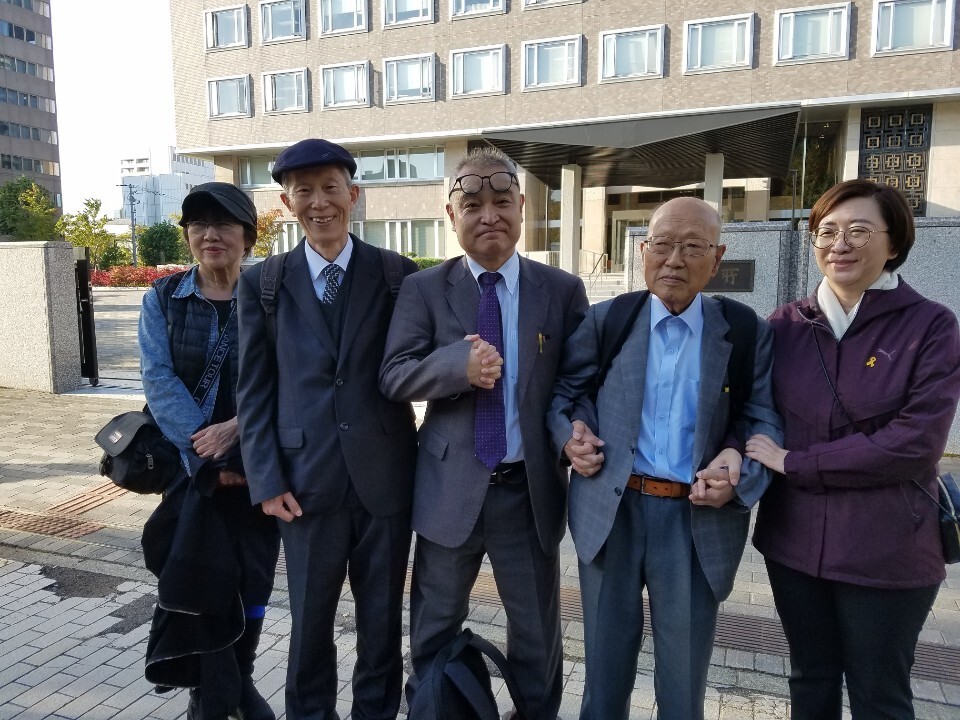hankyoreh
Links to other country sites 다른 나라 사이트 링크
Japanese journalist who reported on comfort women issue sees final hearing in defamation case

“The truth does not sink.”
A familiar message rang out in Korean on the afternoon of Oct. 10 in front of the Sapporo High Court on the Japanese island of Hokkaido. On that day, the court was holding a final hearing in an appellate case filed by Takashi Uemura, a former Asahi Shimbun journalist who was the first to report on the late Kim Hak-sun’s victimization as a “comfort woman” for the Japanese military, against Yoshiko Sakurai, a right-wing figure who attacked his reports as “fabrications.”
The ones shouting the slogan were 12 supporters and members of the group “Association of People Thinking of Takashi Uemura.” They included Lim Jae-kyung, former vice president of the Hankyoreh; Kim Eon-kyung, secretary general of the group Citizens' Coalition for Democratic Media; Kim Seon-ju, a former editorialist for the Hankyoreh; and Kim Yang-rae, a director with the May 18 Memorial Foundation. Standing before them after the trial, Uemura said, “I believe I will win this case. I also think that a battle of solidarity for peace in Northeast Asia is forming through this trial.”
“I will fight to the end,” he pledged.
In 2015, Uemura filed suit against Sakurai and two magazines that published her columns and articles, accusing them of defamation and demanding 5.5 million yen (US$50,935) apiece and the publication of apology advertisements. But the battle in court has not been easy going. In November 2018, Sapporo District Court ruled against him, concluding that while Sakurai’s column had hurt Uemura’s social reputation, she had had “considerable” grounds for believing the claims made in her writings were truthful.
Sakurai’s basis for attacking Uemura’s comfort woman articles as “fabrications” concerned his having written in a 1991 article that a victim had been “taken by force into the volunteer labor corps.” In effect, she was deliberately disregarding the fact that the terms “volunteer labor corps” and “comfort women” were used interchangeably by many news outlets, and even movement groups, at a time in the 1990s when details about the comfort women’s victimization were largely unknown. In the courtroom, Uemura said the “targeting of me for denunciations about ‘fabrications’ was a severe infringement of human rights.”
The gallery in courtroom No. 802, where the trial was taking place, was packed with around 80 Japanese supporters of Uemura. Extra chairs also had to be brought in for Uemura’s defense team, whose more than 20 members filled the box for counsel. Sakurai did not attend the hearing, and her attorneys did not even deliver a statement of opinion. Following statements of opinion from Uemura and his legal team, the hearing was adjourned just a half hour or so after it started, with the judge merely announcing that “sentencing will take place on February 6 of next year.”
Kim Eon-kyung said the case “was a matter of the right wing making up ‘fake news’ in claiming that Uemura’s article was a fabrication.”
“This is an important issue for South Korea, but ahead of that, it’s an extremely important issue in terms of journalism,” she stressed.
Shin Hong-bum, a former editor-in-chief for the Hankyoreh, said Uemura “has endured a lot of hardship, and we wanted to share at least some of that.”
“The truth does not sink,” Shin stressed.
Kim Yang-rae said, “It reminded me of the attorneys who offered pro bono arguments [for figures in the democratization movement] during the military dictatorship era in South Korea. It was infuriating.”
Shinji Nishijima, a Japanese film director who is currently working on a documentary about Uemura’s case titled “Target,” explained, “There’s a large movement in Japan recently where people are trying to pretend that historical matters that are unflattering to Japan never happened.”
“We need to remember history properly. Otherwise, we could end up making the same mistake that Japan did when it waged war in the past,” he said.
By Cho Ki-weon, Tokyo correspondent
Please direct comments or questions to [english@hani.co.kr]

Editorial・opinion
![[Column] When ‘fairness’ means hate and violence [Column] When ‘fairness’ means hate and violence](https://flexible.img.hani.co.kr/flexible/normal/500/300/imgdb/original/2024/0516/7417158465908824.jpg) [Column] When ‘fairness’ means hate and violence
[Column] When ‘fairness’ means hate and violence![[Editorial] Yoon must stop abusing authority to shield himself from investigation [Editorial] Yoon must stop abusing authority to shield himself from investigation](https://flexible.img.hani.co.kr/flexible/normal/500/300/imgdb/original/2024/0516/4417158464854198.jpg) [Editorial] Yoon must stop abusing authority to shield himself from investigation
[Editorial] Yoon must stop abusing authority to shield himself from investigation- [Column] US troop withdrawal from Korea could be the Acheson Line all over
- [Column] How to win back readers who’ve turned to YouTube for news
- [Column] Welcome to the president’s pity party
- [Editorial] Korea must respond firmly to Japan’s attempt to usurp Line
- [Editorial] Transfers of prosecutors investigating Korea’s first lady send chilling message
- [Column] Will Seoul’s ties with Moscow really recover on their own?
- [Column] Samsung’s ‘lost decade’ and Lee Jae-yong’s mismatched chopsticks
- [Correspondent’s column] The real reason the US is worried about Chinese ‘overcapacity’
Most viewed articles
- 1China calls US tariffs ‘madness,’ warns of full-on trade conflict
- 2[Column] US troop withdrawal from Korea could be the Acheson Line all over
- 3[Editorial] Yoon must stop abusing authority to shield himself from investigation
- 4[Column] When ‘fairness’ means hate and violence
- 5[Column] How to win back readers who’ve turned to YouTube for news
- 6US has always pulled troops from Korea unilaterally — is Yoon prepared for it to happen again?
- 7[Book review] Who said Asians can’t make some good trouble?
- 8Naver’s union calls for action from government over possible Japanese buyout of Line
- 9Could Korea’s Naver lose control of Line to Japan?
- 10[Editorial] Korea must respond firmly to Japan’s attempt to usurp Line